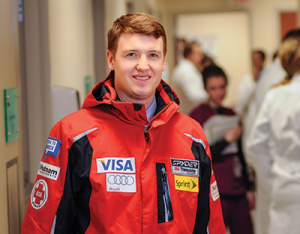At this year’s Olympic Winter Games in Sochi, Russia, more than 20 accidents at Rosa Khutor Extreme Park, the site of the snowboarding and freestyle skiing events such as halfpipe, slopestyle, and moguls, forced many athletes out of the competition. The injuries, widely attributed to dangerous courses and poor conditions, came as no surprise to Scott Faucett, M.D., a team physician for the U.S. Ski and Snowboard teams.

“There were a lot of injuries in the snowboard slopestyle due to the size of the jumps,” explains Faucett, “but snowboard cross and skiercross are notoriously dangerous events because of the speed and the number of athletes on the course at one time vying for the front of the pack.”
Faucett, an assistant professor of orthopedic surgery at GW’s School of Medicine and Health Sciences (SMHS), provides medical assistance for the country’s top athletes as a member of the United States Ski and Snowboard Association Physician Pool. An avid telemark skier, Faucett was a team physician for varsity athletics at Dartmouth College from 2011 to 2012 while pursuing his medical degree at Dartmouth’s Geisel School of Medicine.
“I think it’s fascinating to witness what human beings are capable of,” says Faucett, who completed a fellowship at the world-renowned Steadman Clinic in Vail, Colo., last year, where he collaborated in leading-edge research and trained in the newest surgical techniques. “The role of the team physician is to act as a patient advocate and make sure that a high standard of care is being provided. We don’t have medical licenses to practice abroad, but we do know what to expect if our athletes were to be treated in the United States,” he says. “If they can’t get the appropriate care abroad, we help get them evacuated.”
Though he did not attend the Sochi games, Faucett has traveled to events such as the Burton European Open in Switzerland and the World Cup Race in Beaver Creek, Colo. “Our main goal is athlete safety — to make sure they don’t put themselves at further risk after injury by continuing to compete when it’s unadvisable,” he says. “We also manage the safety and athlete assessments to make sure they are fit for competition and training.”
At the events, team doctors treat more than just musculoskeletal problems. “We come with our own medical kit so that we can treat the athletes for everything — respiratory infections, skin infections, urinary infections,” Faucett explains. “On the slopes,” he continues, “we carry a trauma pack that includes the tools necessary to insert chest tubes and surgical airways, as well as to do splinting.” The most common injuries he sees are to the knee, shoulder, back, wrist, and head.
When he’s not traveling the world with star athletes, Faucett is practicing orthopedics at GW’s Medical Faculty Associates, where he focuses on hip and knee orthoscopic procedures, cartilage restoration, and ligament reconstruction. “I treat all kinds of arthritic and non-arthritic conditions,” he says. “Everything from chronic hip or knee injury to hip or knee replacement.”
“Dr. Faucett brings a unique skill set to our faculty,” says Andrew Neviaser, M.D., assistant professor of orthopedic surgery at SMHS. “He is an expert in joint preservation surgery, particularly in the hip, where he can use minimally invasive techniques in young patients to address bone and cartilage problems, preventing future arthritis and saving them from a future hip replacement.”
The decisions Faucett makes on the slopes are very different from those he makes while practicing in Washington, D.C. “It goes beyond the medicine. These are people’s jobs,” he explains. “But it’s that complexity surrounding the balance of athlete safety and performance that motivates me to continue doing this work.”



